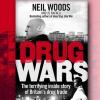12/17/24 Dealing with drugs II - Cities and the international pursuit of sensible regulation
Dealing with drugs II - Cities and the international pursuit of sensible regulation. From Warsaw Poland. Steve Rolles of Transform & Neil Woods Dir of Law Enforcement Action Partnership U.K. Time for regulation and actual control.



